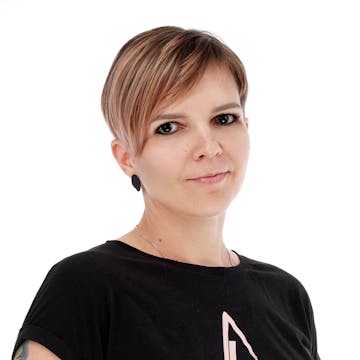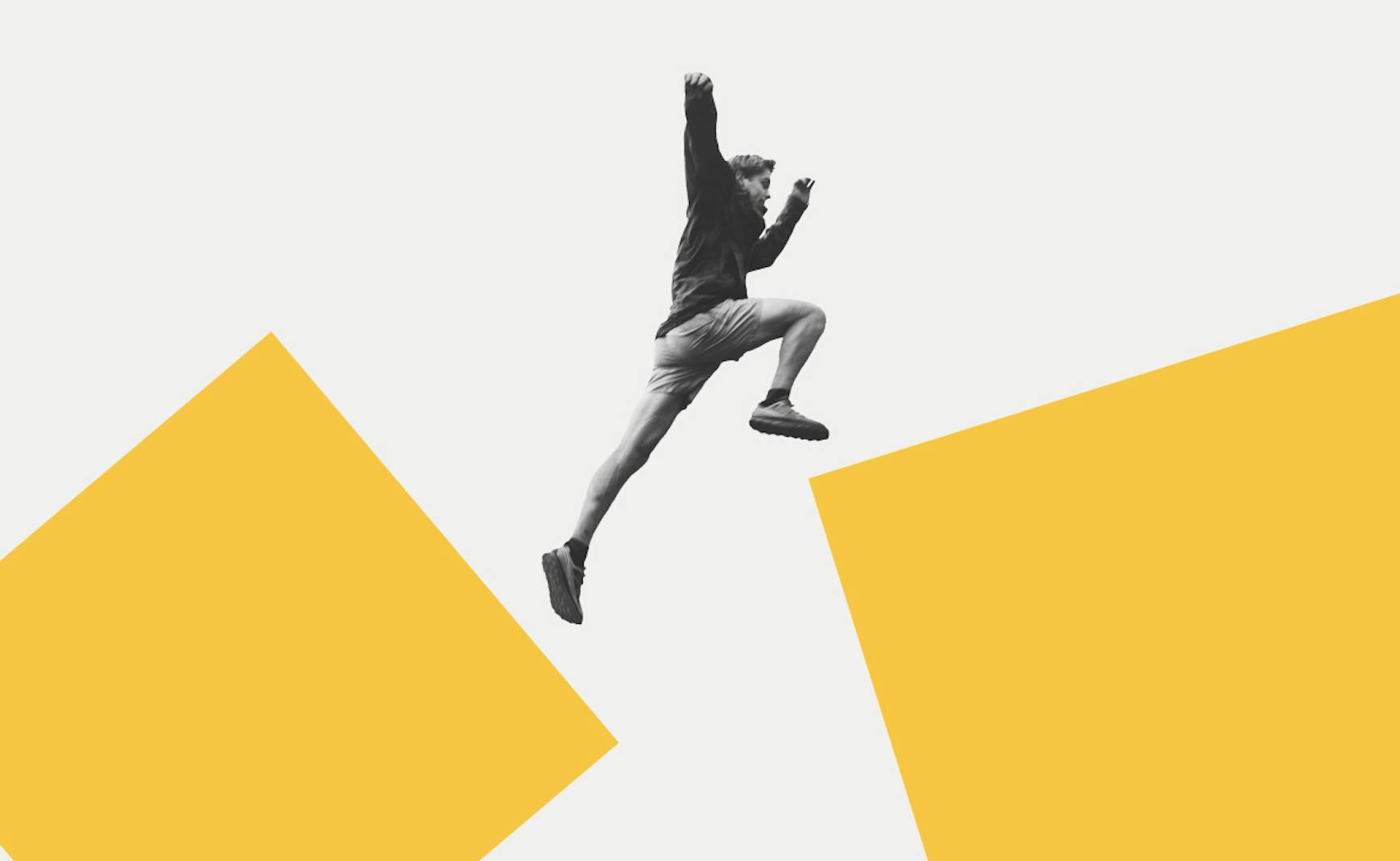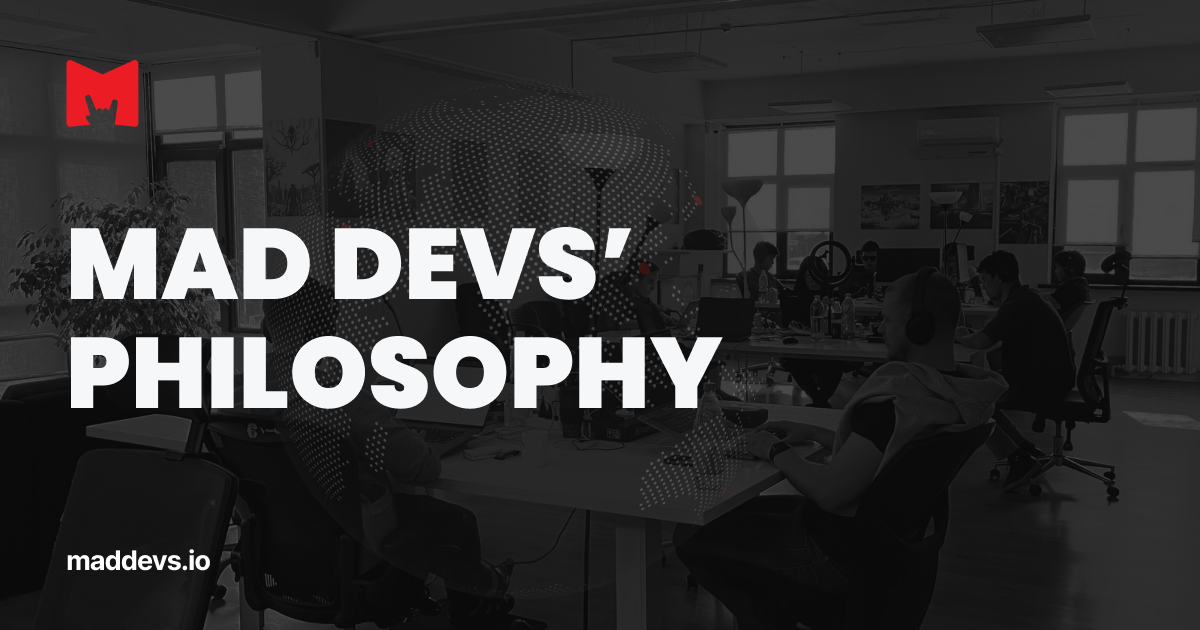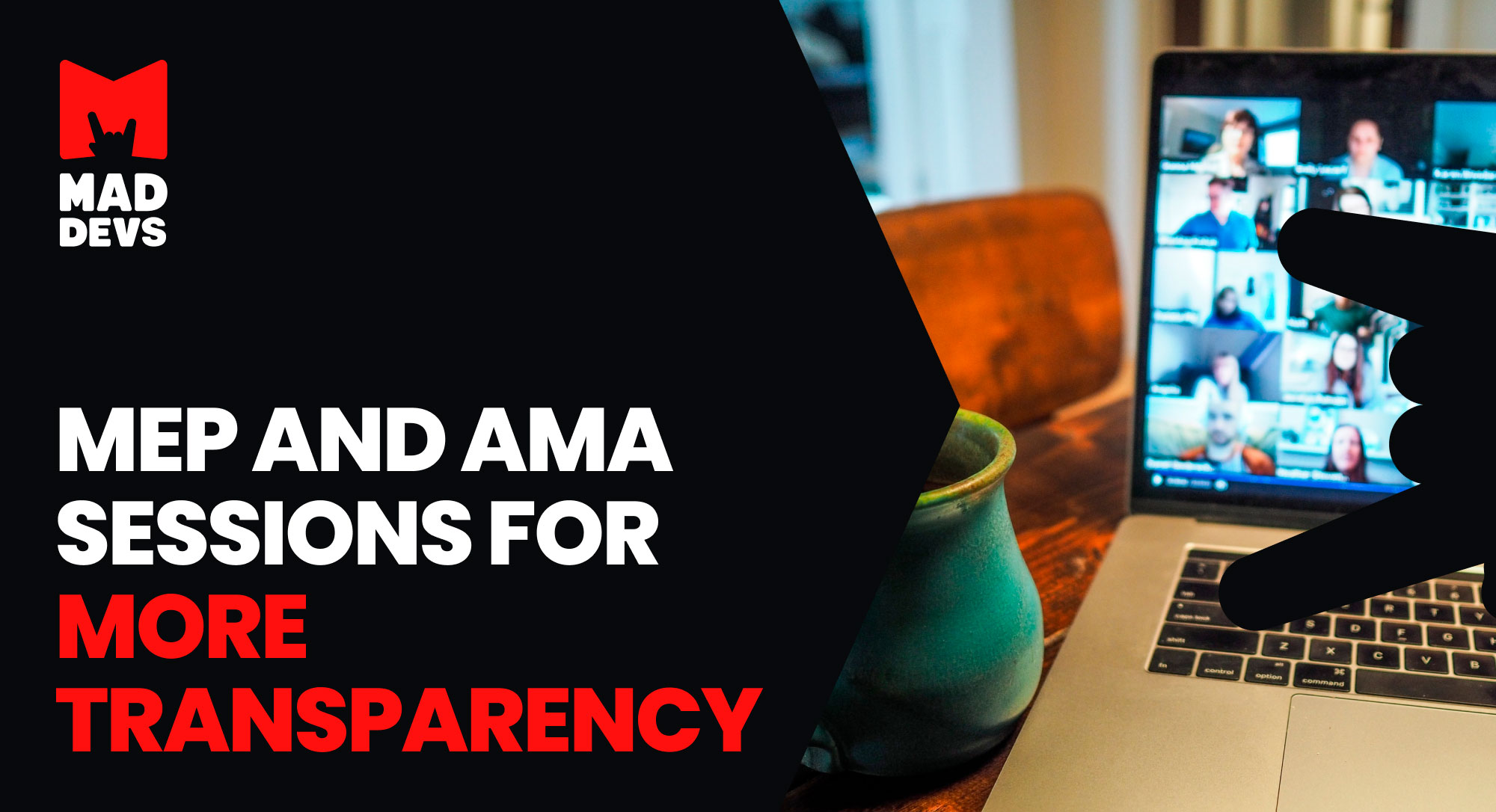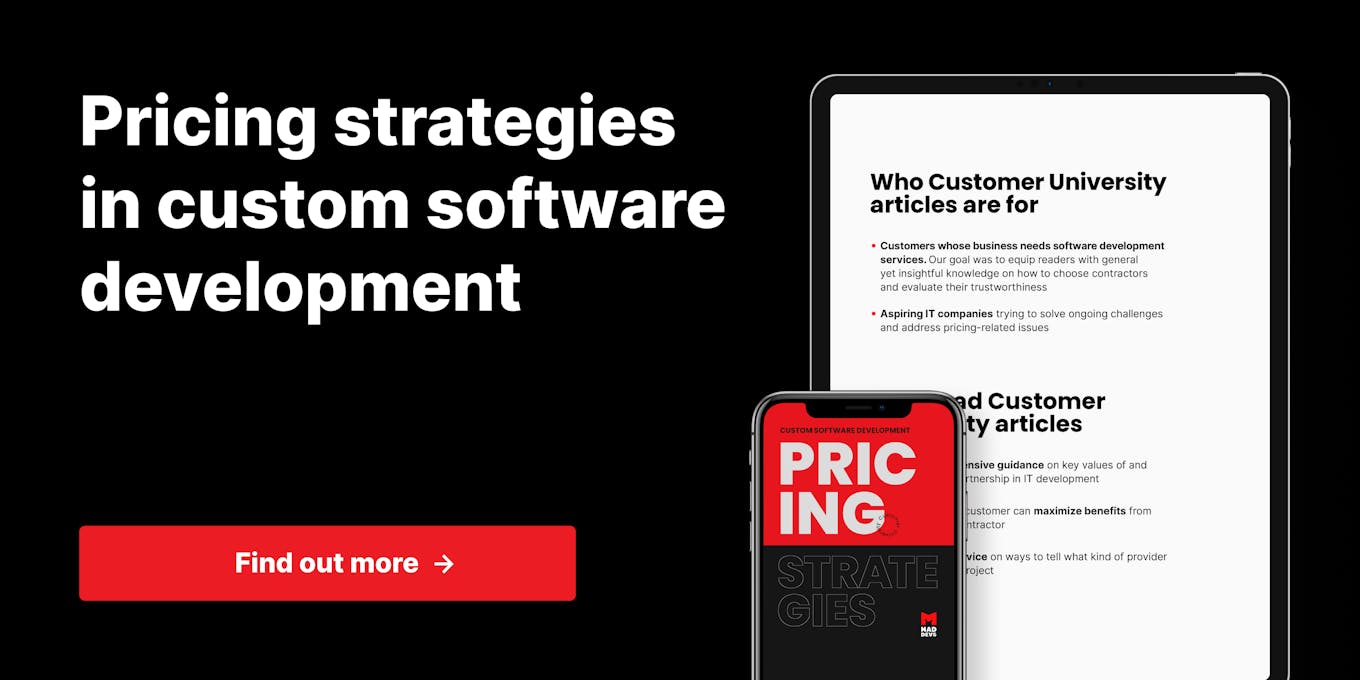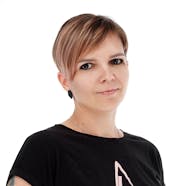Why follow the corporate culture of a company? Well, why does it exist at all, and what is it?
The corporate culture is the environment (both social and psychological) in the company. It refers to the shared values, attitudes, standards, and beliefs that characterize the members of one team or organization.
The corporate culture is important because it supports business objectives. It has a direct impact on the company's overall health, mood and attitudes of employees, and customers. These are the main reasons why it is worth spending time considering why the corporate culture is the way it is.
At Mad Devs, we take it seriously because our corporate culture:
- Defines the internal and external identity of Mad Devs;
- It states our core values;
- It helps us to attract and keep the best people;
- It is what transforms just a company into a team.
Our people
Our communication is based on trust, responsibility, and respect. We work with people who can take responsibilities. We believe that a mature person is able to plan his/her time and work without being controlled, and be responsible for the outcome. That's why we don't have the hierarchy in its common sense.
We encourage our specialists to acquire new knowledge and skills. To do so, the company provides financing for training sessions and courses if a specialist believes that they can help to grow professionally. We encourage both experienced specialists and those who have just joined the team to learn and develop constantly, and we love when our specialists participate in conferences.
Empowering our employees to make decisions
We aim at delivering value, and our employees are welcome to participate in decision-making processes. The MEP (Mad Devs Enhancement Proposal) practice helps to achieve that easily.
Within the MEP, every employee can suggest any changes or improvement to any process. Such suggestions are checked, considered, and, if there is a real need in them, implemented. It is a way to prove that every employee is a part of the company. Our specialists contribute to this idea actively. Here are just a few examples when MEPs were implemented:
- A new bicycle stand was built to offer our specialists a safe and comfortable place to leave their bicycles while at work.
- Articles written by specialists are paid now.
- A physical therapist visits our offices to provide treatment to those employees who need it.
- Every day, we offer our specialists to choose dishes from two different cafes.
Being open to communication
In a company, we believe that communication is a priority if we want to work as a team. We have introduced special practices to ensure all our team members are connected and feel involved:
- We conduct 1:1 meetings to talk to every team member personally and discuss whatever can be discussed. Such talks help us to monitor the mood in the team and assist with issues that our specialists might be facing (not only of professional but of personal character, too).
- We organize AMA (Ask Me Anything) sessions with the company founders where employees can ask them anything. Usually, questions are prepared and submitted in advance. However, spontaneous questions are welcomed, too. This way founders want to show openness to any unexpected questions to increase trust in the team.

Talking about serious things easily
Keybeard – an IT video blog about everything
We share our views, knowledge, and experience not only in inner documents and guides but also on YouTube in Keybeard, the video blog. There, you can learn more about the topics that worry developers nowadays:
- How to work remotely and be efficient;
- Why QA engineers are needed if developers cover their code by tests;
- Why a PM is needed when everything can be controlled and managed with automated tools, and many more topics.
We are open to discussion. The viewers can comment, ask questions, provide their ideas even if they differ from ours, and offer their topics to discuss.
Mad Talks & Mad Stream
We organize special events called Mad Talks to talk about IT and whatever is related to IT. Such events are advertised to the local public for whoever wants to come and to listen to or even to participate.
Mad Stream is an online version of Mad Talks. It was introduced during the pandemic. While everything is the same, the format was moved from offline to online, on YouTube.
Channel link:
Work principles
We embrace the remote-first approach to work. It means that working remotely is welcomed, but the offices are open for those who prefer the office environment.
Whatever our employees choose, we expect that it won't influence work processes and results. That's why some rules are introduced to ensure the work efficiency:
- We use online communication means and project management tools to ensure the smoothness of working processes.
- We document everything to ensure all our workers have access to the required information whether they work from the office or remotely.
- We try to automate the routine processes within the company to enable our specialists to spend their time more efficiently.
- We make commitments, and we do our best to complete our tasks.
- We embrace asynchronous communication to ensure effective cooperation in different time zones.
- Whether we work in the office or remotely, we respect other team members and do whatever is needed to avoid blocking their progress or deteriorating their performance.
To make sure every team member performs properly, we use the following meeting formats:
- Team online meetings help us to discuss the team's progress and arising issues and look for solutions. Usually, such meetings are planned, and notifications and reminders are sent in Slack automatically.
- Daily stand-ups are used to track the progress of every team member and to find out whether they have some issues that don't let them work productively. To get a clear understanding of how the person performs and what blocks the performance, such stand-ups are written based on a specific scheme:
What I did yesterday. Here, an employee describes what tasks he managed to do the day before.
What I plan to do today. Here, the specialist describes what he is going to during the day.
Problems I have. Anything that doesn’t let him work properly.
Good things happened. Something that the person is happy about and so wants to share with the team, a completed project, a new pet, or whatever.
Work-life balance
At Mad Devs, we believe that having proper rest is a must to work with devotedness. That's why our team members don't work on the weekends. We take vacations and days off after agreeing on them preliminary and completing the needed procedures.
We promote a healthy workload and create all conditions for that within the company. We rest together as a team. We go to bars, organize trips to a lake or to the mountains. Along with proper rest, our team can enjoy team-building activities such as pottery classes, for example.

Our clients
We work with clients from all around the world. While the project types and scopes differ from case to case, two main principles form the foundation for the collaboration with our clients. We create trust, and we deliver value.
Trust
We understand trust from different perspectives. The first, and the most important one, is the legal side of our relationship with the client.
NDA and confidentiality
The Mad Devs team works on serious projects with a long-term impact. Almost all of them serve to bring profit to our clients. The more adequately we behave while working on such projects, the more our clients trust us. That's why confidentiality is important. We sign an NDA with every new client to ensure that confidential information stays within the team. We take responsibility for the confidentiality of any project-related data. So, the competitors of our clients cannot take advantage of information leaks.
Trust in communication and work delivery
Here, we mean a more personal side of a relationship. We work in a way to make our clients trust us and avoid the development of the so-called FUD factor (where FUD stands for Fear, Uncertainty, Doubt). Fear, Uncertainty, and Doubt are developed when the client feels manipulation. While everything is clear with intentional manipulation, we understand that it is possible to manipulate a client unintentionally: e.g., by not talking about issues, avoiding open talks about the existing problems, and etc.
To improve trust and avoid the development of FUD, we communicate with clients openly. We provide our clients with objective information about the project's progress and talk about the issues we encounter. Along with informing about the issues, we offer valid solutions to the problems that appear and look for the best options together with our clients.
Value
Whatever project we work on, our aim is to deliver value. Value allows us and our clients to achieve success. In our understanding, the value that we bring consists of the following aspects.
Organization value (value for the company)
We assess the organization value based on:
- Revenue
- Cost savings
- Competitive differentiation
- Brand projection
- Enhanced customer loyalty
- Satisfying regulatory requirements
- Original research
- Strategic information.
The more aspects we cover with the product, the higher is the value that we deliver.
Technical value (value for technical specialists)
Technical value is expressed in how cost-effectively the developer solution can be scaled and maintained. Here are some aspects of technical value:
- The product can be changed easily and rapidly;
- Tests allow detecting what breaks down during code refactoring.
Personal value (value for people)
Here, we mean that everybody shall be successful as a specialist, in his role in the company. Otherwise, the team's efforts will be in vain. Here are just some examples of personal value:
- Senior management: transparency of all processes, return on investment.
- Users, stakeholders: delivery of features with the expected quality within the deadline.
- Developers: improvement of users' life quality through the technical perfection of the product, high rates provided by users and stakeholders, etc.
Delivering value is impossible without the organized work of team members. It is one of the main reasons why we use radiators (an information radiator is a large graphical representation of information about a project kept available for team members within an Agile team workspace) and other tools to track the team success and the performance of business processes. We check how the team members manage to handle their commits, whether the code is covered by tests, the profit that our client generates with our solution, and many other things.
Delivering value to our clients is the main priority of our work, and it is impossible without close communication with our clients at all stages of product development. We add clients in our chats, invite them to team meetings, and provide them with updates on the progress as agreed.
Sustainability
Our corporate culture is one of the pillars of the sustainable growth of our company. At Mad Devs, we create potential to enhance resource efficiency and reduce the impact on the environment. We promote environmentally-conscious programs, educate employees and encourage their contribution to the company's sustainable development.
